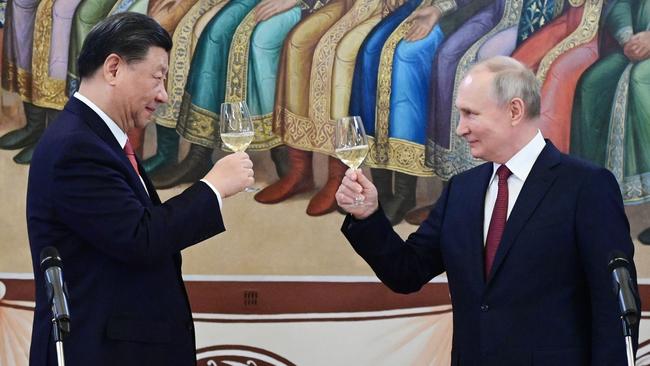Disarray means a moment of uncertainty in Beijing
Fast-moving developments in Russia have made real Beijing’s worry the Ukraine invasion would destabilise its partner against the West.

Armed rebellion in Russia makes real Beijing’s biggest fear surrounding the invasion of Ukraine: that it risked destabilising its closest partner against the US-led West.
“This is that pessimistic scenario that China was afraid of — that (Vladimir) Putin, when he started the invasion, will eventually damage the stability of the regime,” said Temur Umarov, a fellow at the Carnegie Russia Eurasia Centre.
On Chinese state media, news coverage of the insurrection was limited, a contrast with in-depth coverage on most Western media. The state-run Xinhua News Agency carried a report on Mr Putin’s call for the insurrection to be put down and said cities including Moscow had put counter-terrorism measures into action.
A social-media account affiliated to the People’s Liberation Army Strategic Support Force published a post recounting how Mao Zedong reorganised the Communist Party’s revolutionary army in 1927 to ensure that the party exercised absolute control over its military — a post that some users saw as a reference to events in Russia.
“Putin accuses Wagner leader of treason” was the No. 1 trending topic on Chinese social-media platform Weibo as of late Saturday evening in Asia. The mutiny was also trending on other Chinese social-media platforms such as Douyin and Zhihu.
Chinese users have mostly expressed bewilderment and uncertainty about what comes next — but on Weibo any posts referencing qingjunce, a well-known Chinese phrase that refers to powerful officials staging a coup with the goal of eliminating evil or corrupt officials surrounding an emperor, had become inaccessible.
Among ordinary Chinese, “many people worry that Putin’s political standing isn’t stable, and that political turmoil in Russia could affect China”, said Wang Yiwei, an international relations professor at Renmin University of China. “China always emphasises that harmony is to be prized, and with regard to its largest neighbour, China hopes they can maintain stability.”
Chinese President Xi Jinping has been at pains to back Mr Putin even as Moscow’s invasion of Ukraine hit setbacks, while also calling for peace and negotiation to end the violence.
At a March summit, the two men reaffirmed their partnership and their countries’ deepening economic ties. Russia needs China to buy its oil and gas and China is finding in Russia a growing market for China-made cars and smartphones as sanctions strangle imports from the West.
At the core of their alliance is hostility to Washington and its allies and what they see as an unfair and overbearing US-led international order. The two men have met about 40 times as leaders of their respective countries, swapping gifts and honours and regularly wishing each other happy birthday.
Moscow’s invasion of Ukraine sundered Russia’s relations with the West and sanctions have wreaked havoc on its economy.
Washington and its allies have taken steps to throttle China’s access to advanced computer chips on the grounds of national security. Multinational manufacturers are rethinking China’s role in their supply chains in response to concerns over future trade disruptions from frictions with the West or conflict over Taiwan, an island democracy that China considers part of its territory.
The Wall Street Journal



To join the conversation, please log in. Don't have an account? Register
Join the conversation, you are commenting as Logout